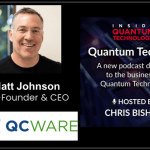Quantum Source Announces $12 Million Seed Extension Round

Quantum Source, a photonics-focused quantum computing start-up, has announced its seed extension round, valued at $12 million. This round is led by Dell Technologies Capital, a “team of investors, technologists, and operators working with people building foundational technologies,” according to their website. With this $12 million, Quantum Source’s seed extension round is one of the largest to date for a quantum computing company. “This $12M seed extension investment will help us accelerate the development of our technology to address critical hurdles in quantum computing, including scalability and error correction,” explained Quantum Source CEO and co-founder Oded Melamed. “We plan to use this funding to expand our research and development team.”
As a quantum computing company focused on photonics as the fundamental structure for a quantum computer, they have a unique approach compared to other quantum computing companies that might develop neutral atom or superconducting qubit technology. “Quantum Source strongly believes that photonics is the best route to achieve large-scale, fault-tolerant, commercially viable quantum computers,” stated Melamed. “The challenge with photonics implementation, however, is the highly inefficient and probabilistic nature of the process for the generation of the entangled photonic cluster states that are the “fuel” of the photonic quantum computer. To address this, Quantum Source leverages unique, cavity-QED-based technology to drastically increase the efficiency of this entangled photonic cluster generation. Specifically, by utilizing single atoms on a photonic chip to both generate single photons and to entangle them into a cluster, we can increase the efficiency of this crucial process by five orders of magnitude.”
Now with their new funding, Melamed is excited to progress their technological developments even more. “Our future goal is to generate mid-sized clusters of entangled photons using our on-chip cavity QED technology,” he added. “Those clusters are the resource-states required for photonic quantum computation. Eventually, our aim is to demonstrate the further entanglement and measurement of these clusters to introduce large-scale, (millions of qubits), fault-tolerant quantum computation.”
Kenna Hughes-Castleberry is a staff writer at Inside Quantum Technology and the Science Communicator at JILA (a partnership between the University of Colorado Boulder and NIST). Her writing beats include deep tech, the metaverse, and quantum technology.



















